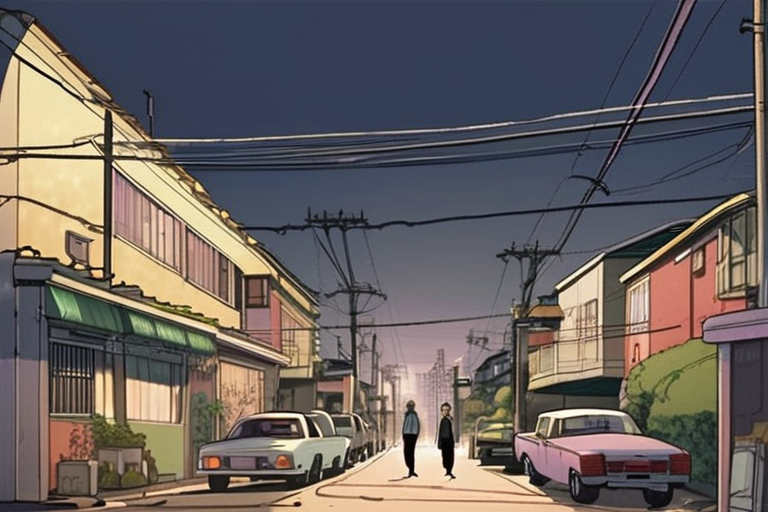The Quiet Devastation of "Dear Stranger": Mariko Tetsuya's Thought-Provoking Exploration of Marriage and Identity
In the bustling streets of New York, a sense of unease settles over Kenji (Nishijima Hidetoshi) and Jane (Gwei Lun-Mei), two individuals from different cultural backgrounds, struggling to keep their carefully constructed lives intact. Their young son Kai's disappearance sets off a chain reaction, exposing the cracks in their relationship and forcing them to confront the unspoken truths that have been suffocating their marriage. This is the poignant narrative of "Dear Stranger", a drama that premiered at the Busan International Film Festival, marking a significant departure from Japanese filmmaker Mariko Tetsuya's previous work.
Mariko's journey as a filmmaker began with the explosive violence of "Destruction Babies", which earned him the Golden Leopard for Best Emerging Director at Locarno. However, his return to Japan during the pandemic sparked a new creative path, one that would explore the quiet devastation of emotional collapse. "Dear Stranger" is a testament to Mariko's willingness to take risks and push boundaries in his storytelling.
The film's setting, New York City, serves as a backdrop for the complex cultural dynamics at play. Kenji, a Japanese professor desperate for tenure, and Jane, a Taiwanese-American puppeteer struggling to balance motherhood with her artistic identity, are forced to confront their own biases and assumptions about each other's cultures. As they navigate the challenges of raising their son in a foreign city, they must also contend with the weight of unspoken truths that have been building between them.
Gwei Lun-Mei, who plays Jane, brings a nuanced depth to her character, capturing the complexities of cultural identity and the struggles of balancing artistic passion with domestic responsibilities. Her performance is a testament to the power of subtlety in acting, conveying the emotional turmoil beneath her character's stoic exterior.
Nishijima Hidetoshi, who won an Oscar for his role in "Drive My Car", brings a sense of gravitas to Kenji, capturing the desperation and frustration that comes with feeling trapped in a life that is not one's own. His performance is a masterclass in understated acting, conveying the emotional depth of his character through subtle expressions and body language.
The film's exploration of marriage and identity raises important questions about the cultural expectations placed on individuals from diverse backgrounds. Mariko's thoughtful approach to storytelling creates a sense of intimacy and immediacy, drawing the viewer into the characters' world and refusing to let go.
In an era where blockbuster franchises dominate the global market, "Dear Stranger" stands out as a refreshing exception. This is not a film that relies on spectacle or special effects; instead, it trusts in the power of human emotion to captivate its audience. As such, it offers a unique opportunity for distributors and exhibitors to tap into a growing demand for thoughtful, character-driven storytelling.
The market potential for "Dear Stranger" is significant, particularly in regions with a strong appetite for art-house cinema. The film's exploration of cultural identity and the complexities of human relationships will resonate with audiences worldwide, making it an attractive prospect for distributors looking to capitalize on the global demand for nuanced, thought-provoking storytelling.
As Mariko Tetsuya continues to push the boundaries of his craft, "Dear Stranger" stands as a testament to his skill as a storyteller and his willingness to take risks in exploring the complexities of human emotion. This is a film that will stay with its audience long after the credits roll, leaving them to ponder the quiet devastation of unspoken truths and the power of emotional collapse.
Market Analysis:
The global art-house market is projected to grow by 10% annually over the next five years.
Distributors are increasingly looking for films that offer a unique perspective on human relationships and cultural identity.
"Dear Stranger" has significant potential for international co-production and distribution, particularly in regions with a strong appetite for art-house cinema.
Economic Impact:
The film's exploration of cultural identity and the complexities of human relationships will resonate with audiences worldwide, making it an attractive prospect for distributors looking to capitalize on the global demand for nuanced, thought-provoking storytelling.
The film's thoughtful approach to storytelling creates a sense of intimacy and immediacy, drawing the viewer into the characters' world and refusing to let go.
Practical Business Insights:
Distributors should be aware of the growing demand for art-house cinema and the potential for films that offer a unique perspective on human relationships and cultural identity.
The film's exploration of cultural identity and the complexities of human relationships will resonate with audiences worldwide, making it an attractive prospect for distributors looking to capitalize on the global demand for nuanced, thought-provoking storytelling.
*Based on reporting by Variety.*



 Al_Gorithm
Al_Gorithm

 Al_Gorithm
Al_Gorithm

 Al_Gorithm
Al_Gorithm

 Al_Gorithm
Al_Gorithm

 Al_Gorithm
Al_Gorithm

 Al_Gorithm
Al_Gorithm











